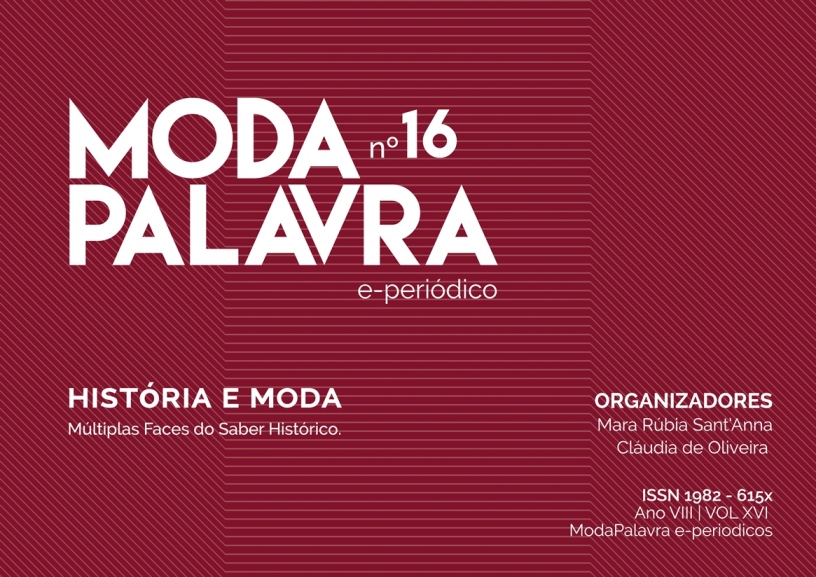A “moda vintage” vista a partir do conceito cronotópico
DOI:
https://doi.org/10.5965/1982615x08162015104Palavras-chave:
cronotopo, vintage, modaResumo
Este artigo se propõe a analisar o conceito de vintage aplicado à moda, mediante à concepção de cronotopo de Mikhail Bakhtin que, por razões de aplicabilidade, foi revista por Anthony Wall. A noção primária deste conceito dentro da filosofia, relatada nos escritos de Bakhtin, refere-se à indissolubilidade do tempo e do espaço na literatura, ao passo que Wall, ao relacionar as relações espácio-temporais à memória, confere uma maior abrangência à compreensão cronotópica, incluindo-a em uma esfera social. Com base nestas ideias, buscou-se analisar as razões pelas quais o sujeito pós-moderno retoma o passado através da reutilização de vestes originais, o que caracteriza a definição da expressão “moda vintage”. Ao relacionar esta prática à memória e à identidade, tornou-se possível observar que a reapropriação de antigas indumentárias é a própria objetivação do conceito cronotópico na moda contemporânea.Downloads
Referências
BAKHTIN, M. Questões de literatura e estética: a teoria do romance.São Paulo: HUCITEC, 2010.
BAUMAN, Z. Identidade.Rio de Janeiro: Jorge Zahar, 2005.
BAUMAN, Z. Modernidade Líquida.Rio de Janeiro: Zahar, 2001.
BLUMER, H. Fashion: from class differentiation to collective selection.Sociological Quarterly, 1969.
BAXTER-WRIGHT, E.; RHODES, Z. Vintage fashion: collecting and wearing designer classics, 1900-1990.New York: Collins Design, 2007.
BATTEZZATI, L. C. A personalização dos ambientes domésticos através do uso dos estilos vintage e retrô na decoração contemporânea. 2010. Dissertação (Mestrado em Tecnologia)-Programa de Pós-Graduação em Tecnologia, Universidade Tecnológica Federal do Paraná, Curitiba.
CAMPOS, Maria Inês Batista. Questões de literatura e de estética: rotas bakhtinianas. In: BRAIT, B. Bakhtin –dialogismo e polifonia.São Paulo: Contexto, 2009, p.113-150.CAUDURO, F. V. Design e pós-modernidade. Revista FAMECOS, Porto Alegre, n. 40, p.113-116, 2009.
CAUDURO, F. V.; PERURENA, P. A retórica visual da pós-modernidade. Revista FAMECOS, Porto Alegre, n. 37, p.107-114, 2008.
CAUDURO, F. V.; RAHDE, M. B. Algumas características da imagens contemporâneas. Revista Fronteiras –Estudos midiáticos, Porto Alegre, Unisinos, V. VII, n. 3, p.195-205, 2005.
CUNHA, A. G. Dicionário etimológico da língua portuguesa.Rio de Janeiro: Lexikon, 2010.
ERNER, G. Vítimas da moda? Como a criamos, por que a seguimos. São Paulo: Editora Senac São Paulo, 2005.
HALBWACHS, M. A memória coletiva.São Paulo: Centauro, 2006.
HALL, S. A identidade cultural na pós-modernidade. Rio de Janeiro: DP&A, 2006.
LYOTARD, J. A condição pós-moderna. São Paulo: José Olympio, 2004.
POLLACK, M. Memória e identidade social. Estudos Históricos 5, Rio de Janeiro, 1992.
SANT’ANNA, M. R. Teoria de Moda: sociedade, imagem e consumo. Florianópolis: Estação das Letras, 2007.
TULVING, E. Episodic and semantic memory.In: TULVING, E.; DONALDSON, W. Organization of memory. New York: Academic Press, 1972.
WALL, A. Los cronotopos de la memória.In: ZAVALA, L.; ALVARADO, R. Voces em el umbral: M. Bajtín y el dialogo atraves de las culturas.Mexico: Dpto. De Educación y Comunicación, 1997. Disponível em: http://bidi.xoc.uam.mx/tabla_contenido_libro.php?id_libro=69. Acesso em 20/01/2015.
Downloads
Publicado
Como Citar
Edição
Seção
Licença
Copyright (c) 2015 Letícia Formoso Assunção, Alexandre Vergínio Assunção

Este trabalho está licenciado sob uma licença Creative Commons Attribution-NonCommercial 4.0 International License.
Ao submeter um artigo para publicação no ModaPalavra e-periódico, o(s) autor(es) concorda(m) com os seguintes termos:
- Autores mantêm os direitos autorais e concedem à revista o direito de primeira publicação, com o trabalho simultaneamente licenciado sob a Creative Commons Atribuição-NãoComercial 4.0 Internacional, que permite o compartilhamento do trabalho com reconhecimento da autoria e publicação inicial nesta revista, sem pagamento;
- Os autores podem utilizar os mesmos resultados em outra publicações após a primeira publicação, desde que indiquem o ModaPalavra e-periódico como o meio de publicação original;
- Autores têm autorização para assumir contratos adicionais separadamente somente após a publicacão inicial no ModaPalavra e-periódico, desde que indiquem o ModaPalavra e-periódico como o meio de publicação original;
- Autores têm permissão e são estimulados a publicar e distribuir seu trabalho on-line (ex.: em repositórios institucionais ou na sua página pessoal), somente após o processo editorial e primeira publicação, desde que indiquem o ModaPalavra e-periódico como o meio de publicação original;
- Para indicar o ModaPalavra e-periódico como o meio de publicação original, o autor deve seguir texto modelo: "Este artigo foi publicado originalmente pelo ModaPalavra e-periódico, sob a licença CC BY NC, em seu volume [inserir volume], número [inserir número] no ano de [inserir ano], e pode ser acessado em: http://www.revistas.udesc.br/index.php/modapalavra/";
- As opiniões expressas nos artigos são de inteira responsabilidade dos autores, não refletindo necessariamente a opinião da revista. A publicação de artigos, fotos e desenhos foi autorizada previamente pelos responsáveis ou seus representantes para publicação no ModaPalavra e-periódico.









